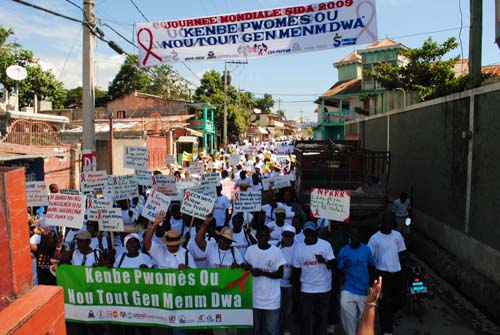Millions around the world came together on Tuesday to show support for those living with HIV/AIDS. Online, in blogs and in forums, many assessed the progress made and the distance left to travel in the fight against discrimination and the spread of the disease. Here's a collection of text, images and video from those writing and speaking in French.
Democratic Republic of Congo
Arkangel88 on Congoforums.net:
C'est dommage de constater qu'aujourd'hui encore, pour bien des gens, le SIDA semblerait toujours être le Syndrome Imaginaire pour Décourage les Amoureux. Les gens ne prennent toujours pas assez des précautions vis-à-vis de ce fléau.
Tunisia
Tunisian blogger zizou from Djerba, writing from South Africa, where the government has just announced a plan to expand treatment to all HIV-positive babies, talks about the discrimination the HIV-positive face back in his country:
Je suis encore en Afrique du sud. ici, une personne sur deux est infecte par le virus du sida. En Tunisie, l'infection est minime ( moins 0.01% de la population), le traitement gratuit est disponible et pourtant j'ai l'impression que nos seropositifs souffrent plus que ceux qui vivent en Afrique du Sud. Ils souffrent du rejet de leurs familles et de la societe. Ils se retrouvent souvent au chomage et sans aucun soutien… et pourtant! Le sida n'est pas la grippe. Il ne se propage que par la voie sexuelle (et encore! ce n'est pas a tous les coups). Donc chers compatriotes, en cette journee mondiale de lutte contre le sida. Ayez une pensee pour ces gens qui souffrent et surtout reflechissez a ce qu'il faut faire pour stopper l'isolement et la stigmatisation de ces malades.
Tekiano.com writes about Silence, a documentary by Tunisian filmmakers Karim Souaki, which will compete in an upcoming film festival in Marseille, France:
Le film brise le «Silence» pesant sur la société tunisienne au sujet du sida, à travers le portrait de «Jimmy», un tunisien porteur du VIH. Ce documentaire évoque la perception du sida dans notre société. Le regard du réalisateur y croise celui de quelques personnes vivant avec le VIH.
Haiti
The fight against discrimination was also evident in the Haitian town of Jacmel, where hundreds of gays and lesbians took to the streets. On PawallaPale.com:
Ils ont à leur tête un ancien pasteur américain…qui a mis sur pied une organisation dont le but est d’aider les homosexuels (hommes et femmes) à vivre positivement tout en étant séropositifs.

Ils demandent également aux milliers d’homosexuels haïtiens de cesser toute hypocrisie. En d’autres termes, qu’ils finissent par s’afficher en tant que tel.
Guadeloupe & Martinique
And finally, in the French Antilles, discrimination was similarly at the center of many of the discussions and public awareness efforts.
Bebel971 , a blog of the UNESCO middle school, Bébel, in Sainte-Rose, Guadeloupe writes:
Vingt ans de lutte… Mais guère d’amélioration. En cette Journée mondiale de lutte contre le sida, l’heure est au bilan. La Guadeloupe demeure, cette année encore, la deuxième région de France la plus touchée par l’épidémie, avec un taux de prévalence 4 fois supérieure à celle de la Métropole.
La stigmatisation est forte en Guadeloupe. Il y a des tabous et les gens ne se font pas dépister, même s’ils désirent le faire car les attitudes discriminatoires et le rejet par la famille sont fréquents.
En terme de dépistage, la haute autorité de santé, souhaite lancer une nouvelle stratégie : le proposer à toute personne de plus de 15 ans qui vient dans un centre de santé, qu’il y ait eu risque ou non. « Si 70% des personnes séropositives étaient dépistées, elles prendraient plus de précaution et moins de risque pour leur santé, souligne docteur Marie-Thérèse Georger-Sow, présidente du Corevih (coordination régionale de lutte contre l’infection due au virus de l’immunodéficience humaine).
Twenty years of fighting…But hardly any improvement. In this World AIDS Day, it's time to take stock. Guadeloupe remains again this year the second region of France most affected by the epidemic, with an infection rate four times higher than that of the metropole.
Discrimination is strong in Guadeloupe. There are taboos and people don't get tested, even if they want to, because discriminatory attitudes and the rejection by family are frequent.
In terms of testing, the health authorities want to launch a new strategy: they are proposing that everyone over 15 years of age come to a health center, whether or not they are at risk. “If 70% of those who are HIV-positive were tested, they would be able to take more precautions and less risk for their health,” explained Dr. Marie-Thérèse Georger-Sow, president of Corevih (regional coordiation of the fight against HIV).
In an effort to fight the attitudes that help support this high infection rate, a new TV spot airing in Guadeloupe and Martinique calls for solidarity with those infected with HIV (via la discrimination dans la publicité):
In Martinique, madinina972bis on DOMActu.com writes:
C'est a ne rien comprendre ,malgré tous ces appels et ces mises en garde il y ai autant de personne atteint de cette maladie.On parle et on parle et personne n'écoute…






